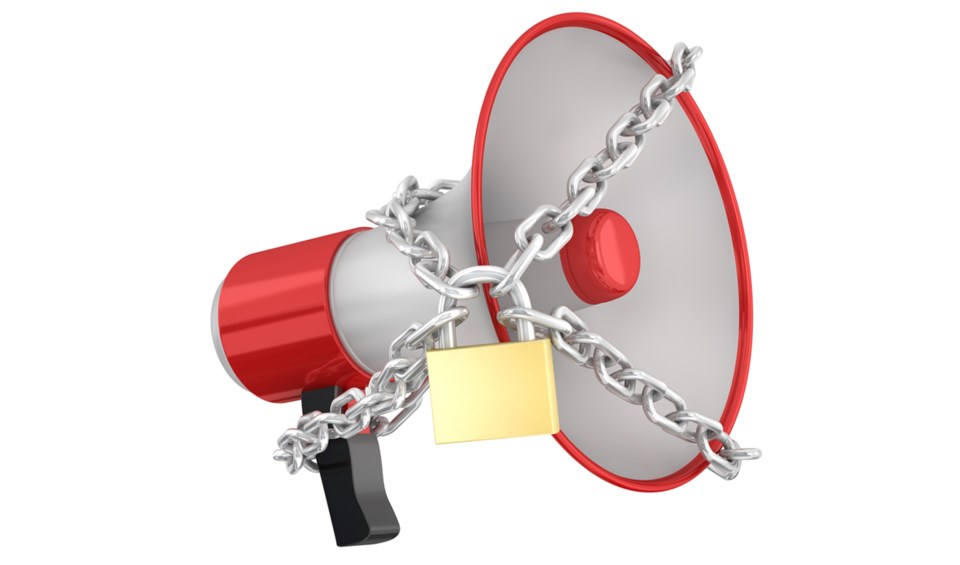Free speech is a core value of a modern democracy, most people agree, but most people believe it more in theory than in practice. Despite the fact that there is more access to more information and opinion than ever before, many people want to constrain this freedom in order to protect freedom.
The moment anyone talks about limiting free speech, there are many questions to ask: whose speech are you restricting; what are they saying that warrants that restriction; who is being protected; do the affected individuals need protecting; and will restricting speech actually protect those individuals.
But the most important question is how is taking away freedom good for freedom?
History is littered with people with good intentions (and people acting like they have good intentions but are actually seizing power for themselves) arguing that the current crisis is so dangerous to society that dissenting viewpoints can’t be tolerated. Around the world, both the left and the right have used this argument to silence opposition and destroy lives.
Currently, the right complain about cancel culture but their beef is actually about free speech.
Currently, the left fret about hurtful and offensive viewpoints expressed by the privileged and the powerful but their grievance is actually about free speech.
Put bluntly, they both want you to shut the hell up because they think you’re wrong and a menace to society.
Too many people on both sides would rather not make their concerns a free speech issue because to do so means they have shared interests with people they vehemently disagree with and they are then obligated to respect the right of those individuals to speak freely with as much passion as they want for themselves and views they agree with.
Sadly, a growing number of people on both sides of the political fence think opposing views shouldn’t be heard because they are “misleading.” That’s their polite way of saying ordinary citizens are too dumb to make up their own minds, can be easily tricked into believing lies and are incapable of reaching more nuanced conclusions that accommodate both sides. Democracy is based on a belief in the wisdom of individual citizens to choose their own leaders and what personal values and beliefs they will adopt and teach their children. Those individual choices can be challenged but to question whether people should be free to make them and express those beliefs is to question democracy itself.
Free speech is like the jellybeans Harry Potter and his fellow students at Hogwarts eat. You might get one that tastes like cake and you might get one that tastes like vomit. The solution is not to ban jellybeans. That vomit jellybean tastes horrible but it doesn’t cause long-term harm. The students keep eating the jellybeans anyway because the tasty ones more than compensate for the nasty ones. They are wary every time they put a jellybean in their mouth. They debate how vomit jellybeans are bad but ammonia jellybeans might be worse. And they recognize there is a huge difference between a jellybean that tastes like ammonia and a jellybean that is ammonia.
A silly metaphor but it still applies. It’s important for everyone to be wary of all free speech and to assess for themselves whether it is good information and analysis or misinformation and propaganda. Some free speech is better than others but that ultimately comes down to personal taste. More importantly, there is a significant difference between offensive views and ones that are truly harmful and poisonous - hate speech and libel - as hard as that can be to distinguish between them.
What does this all mean for The Citizen and my role as editor?
Put simply, over the last two years, for a variety of reasons both personal and professional, I lost faith.
I lost faith in my readers to make up their own minds.
I lost faith in the value of publishing the viewpoints of the entire community, warts and all.
I lost faith in my ability and experience to tell the difference between intolerance (the jellybean that tastes like ammonia) and calls for hatred and violence (the jellybean that is ammonia).
I lost my faith in free speech.
In the weeks and months ahead, look for more diverse opinions and look for less censorship of online comments. Yes, we’re still going to moderate comments before they appear on our website but that’s to protect ourselves legally. If we decide to not publish your comment, we'll tell you why and we'll tell you how you could state it better (which will usually boil down to attack the argument, not the arguer).
No, we’re not going to open comments on Facebook again but that’s a business decision. We simply don’t have the time to moderate those comments and weed out those ammonia jellybeans, plus we (and our advertisers) benefit when you debate one another on our website, rather than Mark Zuckerberg’s.
Look for Citizen staff in general and me in particular to engage with you more on our website. We’ll always try to be respectful and courteous. We only ask that you do the same in return, to us and especially to your fellow readers, recognizing their free speech is as important as yours, even if you think you know it all and everyone else is out to lunch.
What you do (or don’t do) with all of the news and opinion on our website and in our paper is – and always has been – up to you.


